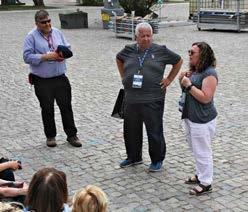
2 minute read
Keeping their memories alive
Vivienne Dacey
Twelve thousand people participated in this year’s March of the Living (MOTL) and our international group comprised 45 Australians and 45 others from around the world. Going on MOTL was a decision I made without too much hesitation. I had been to Poland many years ago, so I knew that what I was going to see would be difficult, but I did not anticipate the impact it would have.
Advertisement
My parents were both Holocaust survivors from Poland, so the Holocaust has always been a part of my life. We did not talk about the Holocaust all the time, but it was just always there, always a silent part of the conversation. Every movie, book or article written about the Holocaust was quickly devoured. My parents’ friends mostly had similar backgrounds, so they all spoke the same language. More so than their spoken tongue of Polish, the language of their experiences connected them. Most of them are gone now, but these memories have loomed larger since my trip.
I felt my parents with me in Poland and could hear their voices talking to me everywhere we went. When I looked at the menus with those familiar choices – kielbasa, pierogi, golabki – my mother’s voice was telling me that they were never as good as hers. And my father’s – speaking incredulously about how much they charged for such a small portion! Those memories warmed my heart and made me giggle.
I found myself walking down the streets of Warsaw imagining my parents with me. If not for the war, my sister and I would have been born and raised there. We would have been educated in their schools, married and had another generation to follow the many that came before. I found my great grandparents’ graves when we visited the Warsaw cemetery, still intact though showing the damage of time. Many in our group felt that all of Poland was a graveyard, but I felt that part of me belonged there. I still yearn for the family I never met, the family I can never know. This sense of overwhelming loss really rocked me.
While walking through the exhibition in Block 27 at Auschwitz, I saw the Book of Names listing more than four million individuals who were murdered. Finding hundreds of names from both my mother’s and father’s families, I broke down inconsolably. It was overwhelming to be suddenly presented with the reality of my tiny family against what it might have been. Having this evidence thrust so menacingly at me in a book of more than 8,000 pages was difficult to digest. The enormity of the loss became even more personal and was suddenly all I could think about.
Standing in front of the incredible POLIN museum, on the site of the former Warsaw Ghetto, I gave my mother’s testimony. I felt her standing with me as I shared some of what she endured in the ghetto in those horrifying times. I could have been standing metres from where she quickly composed herself to grab her sister and hide in a building as the Nazis rounded everyone up to go to the trains. She used her intelligence and intuition to deal with the impossible challenges of her everyday reality. She was a mere 12 or 13 years of age, a girl whose childhood was ripped from her in the most brutal of ways. And yet, she survived. It took all my strength not to break down before finishing her story. I felt the warmth and caring of the 90 or so people listening intently to my words. My mother was the embodiment of strength and resilience and an incredible force in my life, and she was with me as I brought her memory to life.
What was different about this trip to Poland was that I was immersed in a program that prepares you before you go, supports you during the march and continues long after you return home. It is particularly important that the MOTL program provides this continued support as more of us mourn our parents’ passing. It now falls to us, the next generation, to carry their stories and keep their memories alive. Never again!






